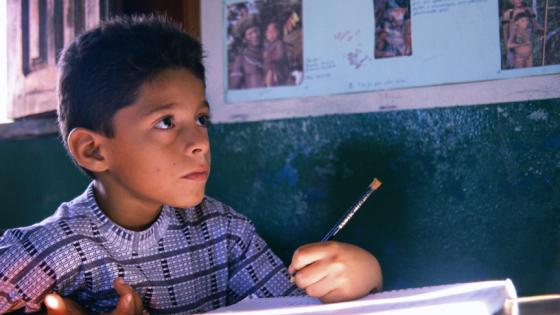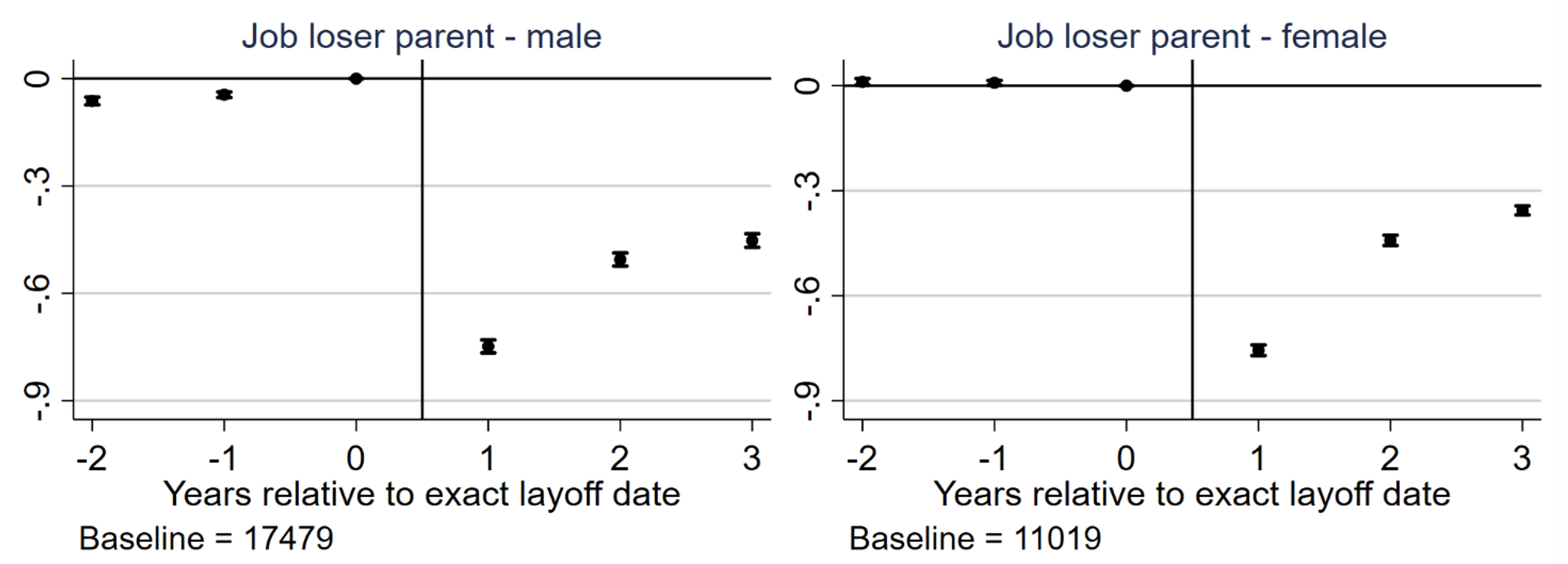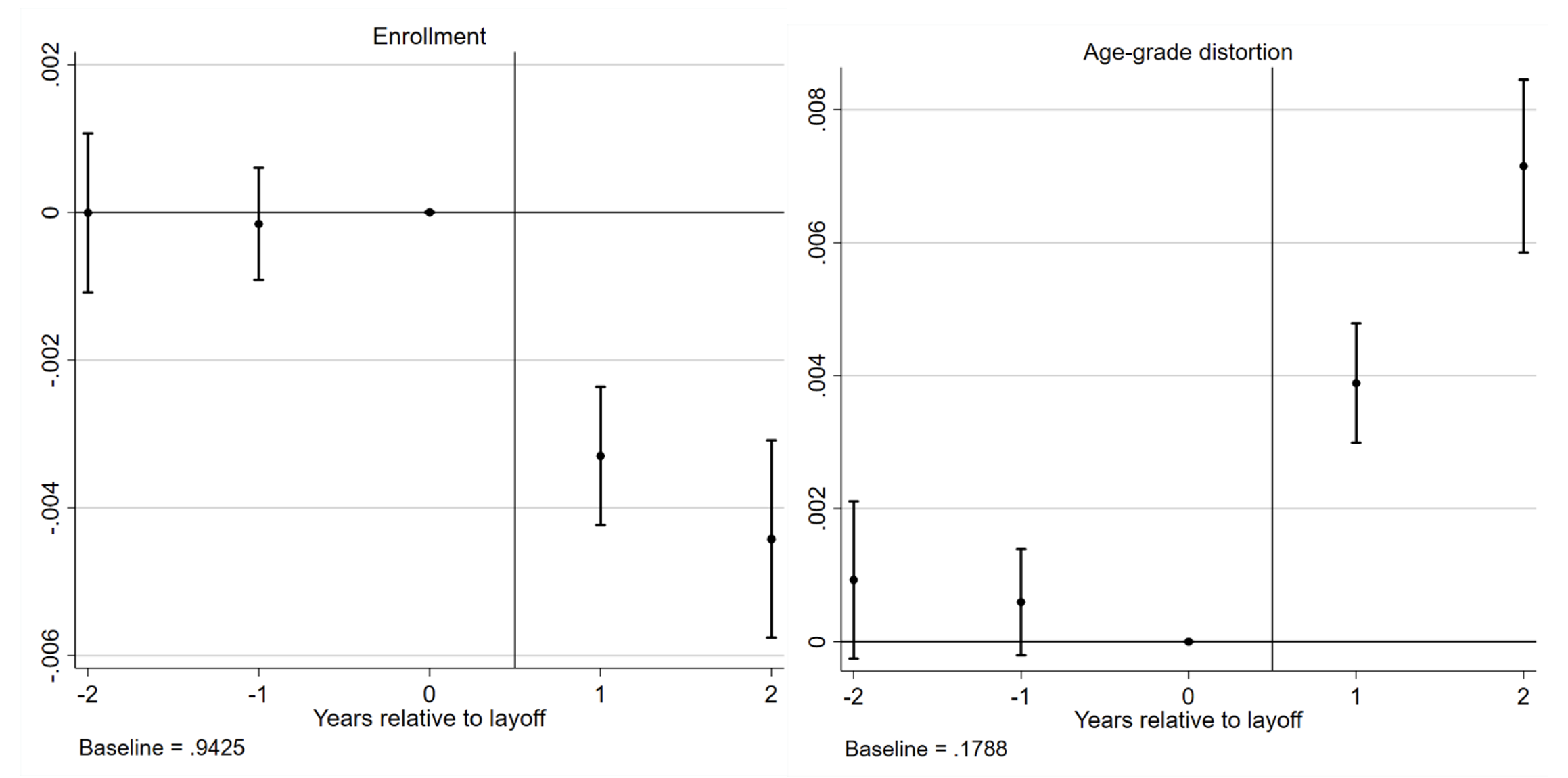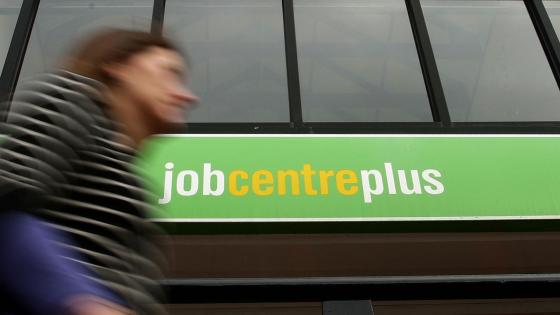Job loss is among the most widespread economic shocks around the globe and ranks among the top concerns for citizens in 28 different countries (IPSOS 2019). A wealth of research has demonstrated that it generates large income losses that persist for many years. For instance, Bertheau et al. (2022) show that earnings losses range from roughly 20% in Sweden, Denmark and France to 40% in Italy and Portugal in the year following displacement. Five years after displacement, these losses are still substantial, ranging from 10% to 35%. In addition, higher labour supply by spouses compensates only for a small part of these losses (Andersen et al. 2021, Bredtmann et al. 2017). Other studies have shown that these consequences go well beyond the labour market: job losers are more likely to commit crimes (Bennett and Ouazad 2020, Britto et al. 2022b, Khanna et al. 2021), domestic violence (Bhalotra et al. 2020), and have worse health (Amorim et al. 2022, Sullivan and Von Wachter 2009) after displacement, to cite a few.
This sizable economic shock could affect the performance of children in school, speed up their transition to the labour market and affect many other dimensions of their lives. On the other hand, at least in principle, children could even benefit if their parents invest more time in their children during unemployment. This column discusses what we know about the consequences of parental job loss for children and presents the results of new research in the Brazilian context (Britto et al. 2022).
Most studies, especially those relying on large and detailed administrative data, are concentrated in the context of developed economies and mainly focus on educational outcomes. Oreopoulos et al. (2008) show an association between parental job loss and lower earnings and education. One concern with this earlier analysis is that there is no source of exogenous variation in layoffs, so the association between parental displacement and worse outcomes could be confounded by other factors such as divorce or health shocks. Rege et al. (2011) go a step further and provide an analysis based on workers displaced due to plant closures in Norway. They find that children perform worse in schools after paternal layoffs and argue that the impacts may be explained by the fact that some mothers enter the labour market to compensate for income losses in the household, in addition to marital dissolution and changes in the residential location. As a consequence, this reduces maternal time investments, leading to worse school performance. Hilger (2016) exploits the timing of parental displacement in the US, showing that children whose parents are displaced shortly before the college starting age are less likely to enrol in college. Overall, the estimated effects are small, and the author explains this finding by the fact that students in the US have good access to different forms of financial aid, which largely mitigate impacts on children.
Do these effects differ in the context of a middle-income country where poverty levels are much higher, and the social safety net is limited relative to rich countries? Earlier evidence by Duryea et al. (2007) suggests a positive association between job loss, school dropouts and teenage work in Brazil. Di Maio and Nisticò (2019) show that conflict between Palestine and Israel leads to job loss by Palestinian parents working in Israel and school dropouts by Palestinian children.
In a recent paper (Britto et al. 2022a), Caique Melo, Breno Sampaio, and I analyse this question in the context of Brazil while relying on extremely rich administrative data sources. We take a comprehensive approach and analyse several children’s outcomes within and beyond the educational system to gain insight into mechanisms. Importantly, we investigate whether public policy can mitigate the impacts of parental job loss on children. Specifically, we study for the first time whether access to unemployment insurance (UI) benefits by parents can be beneficial for children. This addresses both a policy-relevant question – UI is the most widespread job insurance policy in the world – and also helps us understand the role of income losses as a mechanism.
What do we find in this new research? Our analysis compares over time children whose parents lost a job in mass layoffs relative to similar children whose parents were not displaced. Hence, we use the timing of mass layoffs as our source of exogenous variation. We start by documenting that job loss leads to large income losses in the family (Figure 1). Earnings decrease by more than 70% in the first year after layoff both when the father or the mother is the job loser. Three years after, these losses remain as large as 48% and 39% for fathers and mothers, respectively. In line with the findings of previous research, spousal labour supply compensates for only a very small share of these losses.
Figure 1 Job loss effects on labour income for fathers and mothers, effects relative to the baseline yearly income in BRL
Source: Britto et al. (2022a)
What happens to children’s education then? We track school outcomes for children aged 9-15 years old before job loss and show that parental job loss increases the likelihood that they leave school by a half-percentage point, a roughly 10% increase relative to the baseline dropout rate (Figure 2, left panel). These impacts are twice as large for teenage children and significantly stronger for children in poorer families. Next, we show that even children who manage to stay in school suffer consequences; there is a seven percentage point increase in the probability that they have slow grade progression due to retention (Figure 2, right panel).
Figure 2 Parental job loss effects on children’s school enrollment and the probability that children are overage for their grade
Source: Britto et al. (2022a)
We go beyond and show that other key dimensions of children’s lives are also affected. Specifically, we provide novel evidence that parental job loss increases teenage work (in the informal labour market), teenage crimes for boys and teenage fertility for girls. Youth crime rates increase by up to 33% relative to the baseline, and early pregnancy by girls increases by 18%.
What mechanisms can explain these effects? We argue that these effects can be explained by the substantial income losses brought by job loss. This is in line with the findings that the impacts are stronger for children in poorer families, who are more likely to be financially constrained. It is also in line with the fact that children are more likely to work and commit a crime, suggesting that teenage children may try to compensate for the income losses in the family (note that above 75% of crimes committed by young individuals are economically motivated). We complement these results with novel evidence that parental job loss affects school choices. Children previously enrolled in private schools are more likely to move to public schools, indicating that financially constrained parents need to reduce education investments in children. In addition, the evidence showing that teenage fertility increases after job loss suggests that there might also be some role for a psychological mechanism, whereby financial constraints after layoffs lead to psychological turmoil in the household.
Finally, we provide evidence that access to unemployment benefits can mitigate some of these adverse effects, especially on teenage children. We exploit a clean regression discontinuity design where we compare parents who are marginally eligible and ineligible for 3-5 months of UI due to slight differences in layoff dates. We find that children in families whose parents are marginally eligible for UI benefits are more likely to stay in school (Figure 3) and less likely to commit a crime. We also find some evidence that access to unemployment benefits increases the likelihood that children stay in higher quality and private schools.
Figure 3 Effects of access to unemployment benefits on teenage children's school enrollment, before (placebo) and after the layoff, regression discontinuity plots
Source: Britto et al. (2022a)
These findings on UI provide compelling evidence that worse outcomes by children after parental displacement are largely driven by the income losses caused by job loss. They also show that UI may be an effective policy to mitigate impacts on teenage children. Although UI transfers account only for a small part of the income losses caused by job loss, they are highly effective and compensate for a sizable part of the adverse effects on school dropouts and crime by teenage boys. Moreover, the additional education accrued by children will likely lead to higher earnings in the future and higher tax collection. The additional taxes will compensate for some of the costs of the UI policy. We provide a back-of-the-envelope calculation showing that taking these into account reduces by roughly 60% the traditional efficiency costs of UI provision due to lower job searches in Brazil.
Overall, we conclude that parental job loss has important negative consequences for children. These impacts seem to be larger relative to the previous evidence based on rich countries where higher levels of social insurance are available. Our findings showing that access to UI can mitigate some of the effects are in line with the idea that social insurance may be a relevant factor explaining cross-country differences. In future research, it would be interesting to investigate the impacts of parental job loss on children’s outcomes beyond the schooling domain in other countries, as documented in Brazil.
References
Amorim, G, D G C Britto, A D A Fonseca and B Sampaio (2022), “Job Loss, Unemployment Insurance and Health: Evidence from Brazil”, Working paper.
Andersen, A L, A S Jensen, N Johannesen, C T Kreiner, S Leth-Petersen and A Sheridan (2021), “How households self-insure against job loss”, VoxEU.org, 8 June.
Bredtmann, J, S Otten and C Rulff (2017), “The responsiveness of wives’ labour supply to their husband’s job loss”, VoxEU.org, 21 December.
Bertheau, A, E M Acabbi, C Barcelo, A Gulyas, S Lombardi and R Saggio (2022), “The unequal cost of job loss across countries”, VoxEU.org, 11 March.
Bhalotra, S (2020), “A shadow pandemic of domestic violence: The potential role of job loss and unemployment benefits”, VoxEU.org, 13 November.
Bennett, P and A Ouazad (2020), “Job displacement, unemployment, and crime: Evidence from danish microdata and reforms”, Journal of the European Economic Association 18(5): 2182-2220.
Britto, D G C , C Melo and B Sampaio (2022a), “The Kids Aren't Alright: Parental Job Loss and Children's Outcomes within and beyond Schools”, CEPR Discussion Paper No. 17562.
Britto, D G C , P Pinotti and B Sampaio (2022b), “The effect of job loss and unemployment insurance on crime in Brazil”, Econometrica 90(4): 1393-1423.
Di Maio, M and R Nisticò (2019), “The effect of parental job loss on child school dropout: Evidence from the Occupied Palestinian Territories”, Journal of Development Economics 141: 102375.
Duryea, S, D Lam and D Levison (2007), “Effects of economic shocks on children's employment and schooling in Brazil”, Journal of Development Economics 84(1): 188-214.
Hilger, N G (2016), “Parental job loss and children's long-term outcomes: Evidence from 7 million fathers' layoffs”, American Economic Journal: Applied Economics 8(3): 247-83.
Khanna, G, C Medina, A Nyshadham, C Posso and J Tamayo (2021), “Job Loss, Credit, and Crime in Colombia”, American Economic Review: Insights 3(1): 97-114.
Oreopoulos, P, M Page and A H Stevens (2008), “The intergenerational effects of worker displacement”, Journal of Labor Economics 26(3): 455-483.
Rege, M, K Telle and M Votruba (2011), “Parental job loss and children's school performance”, The Review of Economic Studies 78(4): 1462-1489.
Sullivan, D and T Von Wachter (2009), “Job displacement and mortality: An analysis using administrative data”, The Quarterly Journal of Economics 124(3): 1265-1306.






